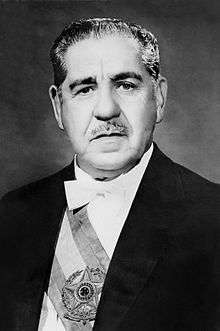President of Brazil
| President of Brazil | |
|---|---|
|
| |
| Style |
Madam President (informal) Most Excellent Madam President of the Republic (formal) Her Excellency (alternative formal, diplomatic) |
| Residence | Palácio da Alvorada |
| Seat | Brasília |
| Term length | Four years, renewable once consecutively |
| Inaugural holder |
Deodoro da Fonseca February 26, 1891 |
| Formation |
Proclamation of the Republic November 15, 1889 |
| Salary | R$320,678 annually[1] |
| Website | planalto.gov.br |
 |
| This article is part of a series on the politics and government of Brazil |
|
| Foreign relations |
|
Politics portal |
The President of Brazil, officially the President of the Federative Republic of Brazil (Portuguese: Presidente da República Federativa do Brasil), or simply the President of the Republic, is both head of state and head of government of the Federative Republic of Brazil. The president leads the executive branch of the federal government and is the commander-in-chief of the Brazilian Armed Forces. The presidential system was established in 1889, upon the proclamation of the republic in a military coup d'état against Emperor Pedro II. Since then, Brazil has had six constitutions, three dictatorships, and three democratic periods. During these democratic periods, voting has always been compulsory. The Brazilian Federal Constitution, along with several constitutional amendments, establishes the requirements, powers, and responsibilities of the president, as well as the term of office and method of election.[2]
According to the Federal Constitution, the president must be a native-born citizen of Brazil, be at least 35 years of age, be a resident in Brazil, be an elector, be in full exercise of their electoral rights, and be inscribed in a political party (write-in candidates are forbidden).
Powers
As a republic with a presidential executive, Brazil grants significant powers to the president. He or she effectively controls the executive branch, represents the country abroad, and appoints the cabinet and, with the approval of the Senate, the judges for the Supreme Federal Court. The president is also the commander-in-chief of the armed forces.
Presidents in Brazil also have significant lawmaking powers, exercised either by proposing laws to the National Congress, or else by using Medidas Provisórias (provisional measures), an instrument with the force of law that the president can enact in cases of urgency and necessity, except to make changes to some areas of law (provisional measures cannot be used to change criminal law, and electoral law). A provisional measure comes into effect immediately, before Congress votes on it, and remains in force for up to 60 days unless Congress votes to rescind it. This 60-day period can be extended once, up to a maximum of 120 days. If Congress, on the other hand, votes to approve the provisional measure, it becomes an actual law, with changes decided by the legislative branch. The provisional measure expires at the end of the 60-day period (or 120-day, in case of extension), or sooner, if rejected by one of the Houses of Congress.[3]
Article 84 of the current Federal Constitution, determines that the president has the power to:
- appoint and dismiss the ministers of state;
- exercise, with the assistance of the ministers of state, the higher management of the federal administration;
- start the legislative procedure, in the manner and in the cases set forth in the constitution;
- sanction, promulgate and order the publication of laws, as well as to issue decrees and regulations for the true enforcement thereof;
- veto bills, wholly or in part;
- provide, by means of decree, on organization and structure of federal administration, in the cases where there is neither increase of expenses nor creation or extinction of public agencies; and extinction of offices or positions, when vacant;
- maintain relations with foreign States and to accredit their diplomatic representatives;
- conclude international treaties, conventions and acts, subject to the ratification of the National Congress;
- decree the state of defense and the state of siege, in accordance with the constitutional procedures that shall precede and authorize those emergency decrees;
- decree and enforce federal intervention, in accordance with the constitutional procedures that shall precede and authorize such exceptional action;
- upon the opening of the legislative session, send a government message and plan to the National Congress, describing the state of the nation and requesting the actions he deems necessary;
- grant pardons and reduce sentences, after hearing the entities instituted by law, if necessary;
- exercise the supreme command of the armed forces, appoint the commanders of navy, army and air force, promote general officers and to appoint them to the offices held exclusively by them;
- appoint, after approval by the Federal Senate, the Justices of the Supreme Federal Court and those of the superior courts, the Governors of the territories, the Prosecutor General of the Republic, the president and the directors of the Central Bank and other civil servants, when established by law;
- appoint, with due regard for the provisions of article 73, the Justices of the Court of Accounts of the Union;
- appoint judges in the events established by this constitution and the Attorney General of the Union;
- appoint members of the Council of the Republic, in accordance with article 89, VII;
- summon and preside over the Council of the Republic and the National Defense Council;
- declare war, in the event of foreign aggression, authorized by the National Congress or confirmed by it, whenever it occurs between legislative sessions and, under the same conditions, to decree full or partial national mobilization;
- make peace, authorized or confirmed by the National Congress;
- award decorations and honorary distinctions;
- permit, in the cases set forth by supplementary law, foreign forces to pass through the national territory, or to remain temporarily therein;
- submit to the National Congress the pluriannual plan, the bill of budgetary directives and the budget proposals set forth in this constitution;
- render, each year, accounts to the National Congress concerning the previous fiscal year, within sixty days of the opening of the legislative session;
- fill and abolish federal government positions, as set forth by law;
- issue provisional measures, with force of law, according to article 62;
- perform other duties set forth in the constitution.
Term limits
The presidential term of office is currently four years. The current length of the presidential term of office was adopted in 1994 by means of a constitutional amendment (review constitutional amendment number 5). From 1889 to 1937 and again from 1945 to 1997, the president was barred from immediate reelection. In 1997, however, the 16th amendment allowed a president to be elected any number of times, but not more than twice in a row. A former president, even one who already served two consecutive terms, can become a candidate for the presidency again, provided that he or she is not a candidate for the four-year period immediately succeeding the second term.
A vice-president or another officer in the line of succession who succeeds to the presidency or who serves, albeit briefly, as acting president during a certain presidential term (which all Brazilian vice-presidents do, given the Brazilian tradition of the vice-president becoming acting president during the president's travels abroad) can subsequently be elected to the presidency once only and the consecutive term limit already applies.
Running for other offices
Although reelection to the same office is allowed once consecutively, Brazilian presidents cannot run for a different office while serving in the presidency. In order to be eligible as a candidate for a different office, per the federal constitution, a president of Brazil would need to resign his or her office six months before the date of the elections. The same rule applies to governors and mayors.
Compensation and privileges of office
| Presidential styles of Dilma Rousseff | |
|---|---|
 | |
| Reference style |
Sua Excelência a Presidenta[4] da República or A Excelentíssima Senhora Presidenta da República "Her Excellency the President of the Republic" or "The Most Excellent Madam President of the Republic" |
| Spoken style |
Vossa Excelência or Excelentíssima Senhora Presidenta da República "Your Excellency" or "Most Excellent Madam President of the Republic" |
| Alternative style |
Senhora Presidenta "Madam President" |
As of February 1, 2011,[5] the president earns a monthly salary of R$26,723,[1] along with an undisclosed expense account to cover travel, goods and services while in office.[6] The most recent raise in salary was approved by Congress in December 2010 and went into effect in February 2011.[1] Given that in Brazil all private and public sector employees and civil servants receive an additional compensation equivalent to one monthly salary after a year of work (this compensation is known as the thirtheenth salary), the President receives 13 payments per year, resulting in an annual salary of R$347,400.
The Palácio do Planalto in Brasília is the official workplace of the president and the Palácio da Alvorada his/her official residence; he/she is entitled to use its staff and facilities.[7][8] The Residência Oficial do Torto, popularly known as Granja do Torto, is a ranch located on the outskirts of the capital and is used as a country retreat by the president.[9] The Palácio Rio Negro in Petrópolis, Rio de Janeiro, is a summer retreat of the president, although used rarely.[10]
In addition, the presidency of the republic also maintains the Jaburu Palace in Brasília for use by the Vice-President of the Republic as his official residence.
In the 2000s, the federal government decided to establish Regional Offices of the Presidency of the Republic in certain key Brazilian cities. Those regional offices are not presidential residences, but they are fully staffed offices ready to receive the president and his ministers at any time, and they function as a presidential workplace when the President is in those cities. The first regional office of the presidency was established in the city of São Paulo, and is located at the Banco do Brasil building at the Paulista Avenue; the building also houses Banco do Brasil's regional headquarters in São Paulo. The presidency of the republic also maintains regional offices in Porto Alegre and in Belo Horizonte.
For ground travel, the president uses the presidential state car, which is an armored version of the 2011 Ford Fusion Hybrid[11][12] built on a Ford CD3 platform. A 1952 Rolls Royce Silver Wraith is used by the president on ceremonial occasions, such as Independence Day commemorations, state visits and the inauguration of the president-elect.[13] A modified version of the Airbus A319, air force designation VC-1A, is used to transport the president on all medium and long-range international flights.[14][15] Two modified Embraer 190 jets, air force designation VC-2, are used for short and medium range presidential travel.[16] When the president is on board, the aircraft receive the call sign "Brazilian Air Force One".[15] Two modified military versions of the Eurocopter Super Puma, air force designation VH-34, are currently used as the main presidential helicopters.[17]
- Presidential Amenities
-

The President's office (as decorated during the Lula administration)
-

Main presidential aircraft (VC-1A)
-

Secondary presidential aircraft (VC-2)
-
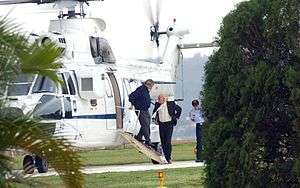
Presidential helicopter (VH-34)
Post-presidency
The following privileges are guaranteed to former presidents by law:
- Permanent security protection (by the presidential guard – Batalhão da Guarda Presidencial)
- The use of two official vehicles (for life)
- Repository funding for a presidential library
- Lifelong monthly pension for widows and unmarried daughters of ex-presidents;
- Pension for sons of ex-presidents until they come of age, should a president or former president die leaving an underage son.
- Living former presidents
-

José Sarney,
served 1985–1990
April 24, 1930 -

Fernando Collor de Mello,
served 1990–1992
August 12, 1949 -
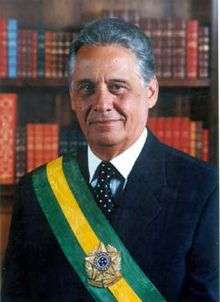
Fernando Henrique Cardoso,
served 1995–2003
June 18, 1931 -
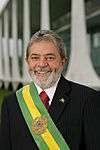
Luiz Inácio Lula da Silva,
served 2003–2010
October 27, 1945
Office-holders
All presidents of Brazil bore the title President of the Republic. That title has been used by all the constitutions of Brazil since the proclamation of the Republic to refer to the head of the Executive Branch.
However, from the proclamation of the Republic in 1889 until 1937 the country was officially styled Republic of the United States of Brazil, and from 1937 to 1967 the country was styled simply The United States of Brazil, and thus the full title of the Presidents of the Republic from 1891 until 1967 --- that is, from Deodoro da Fonseca's inauguration as President (between 1889 and 1891 he served as Head of the Provisional Government) until the end of Humberto Castello Branco's term in 1967 --- was President of the Republic of the United States of Brazil. On March 15, 1967, the country's official name was changed to Federative Republic of Brazil. On that same date, Arthur da Costa e Silva was sworn in as President succeeding Castello Branco. Since Costa e Silva, therefore, all presidents of Brazil have borne the full title of President of the Federative Republic of Brazil.
Presidents by home state
![]() Minas Gerais: 9 (Afonso Pena, Venceslau Brás, Delfim Moreira, Arthur Bernardes, Carlos Luz, Juscelino Kubitschek, Tancredo Neves, Itamar Franco, Dilma Rousseff)
Minas Gerais: 9 (Afonso Pena, Venceslau Brás, Delfim Moreira, Arthur Bernardes, Carlos Luz, Juscelino Kubitschek, Tancredo Neves, Itamar Franco, Dilma Rousseff)
![]() Rio Grande do Sul: 6 (Hermes da Fonseca, Getúlio Vargas, João Goulart, Artur da Costa e Silva, Emílio Garrastazu Médici, Ernesto Geisel)
Rio Grande do Sul: 6 (Hermes da Fonseca, Getúlio Vargas, João Goulart, Artur da Costa e Silva, Emílio Garrastazu Médici, Ernesto Geisel)
![]() Rio de Janeiro: 5 (Nilo Peçanha, Washington Luís, João Figueiredo, Fernando Collor de Mello, Fernando Henrique Cardoso)
Rio de Janeiro: 5 (Nilo Peçanha, Washington Luís, João Figueiredo, Fernando Collor de Mello, Fernando Henrique Cardoso)
![]() São Paulo: 5 (Prudente de Morais, Campos Sales, Rodrigues Alves, Júlio Prestes, Ranieri Mazzilli)
São Paulo: 5 (Prudente de Morais, Campos Sales, Rodrigues Alves, Júlio Prestes, Ranieri Mazzilli)
![]() Alagoas: 2 (Deodoro da Fonseca, Floriano Peixoto)
Alagoas: 2 (Deodoro da Fonseca, Floriano Peixoto)
![]() Ceará: 2 (José Linhares, Castelo Branco)
Ceará: 2 (José Linhares, Castelo Branco)
![]() Mato Grosso: 2 (Eurico Gaspar Dutra, Jânio Quadros)
Mato Grosso: 2 (Eurico Gaspar Dutra, Jânio Quadros)
![]() Maranhão: 1 (José Sarney)
Maranhão: 1 (José Sarney)
![]() Paraíba: 1 (Epitácio Pessoa)
Paraíba: 1 (Epitácio Pessoa)
![]() Pernambuco: 1 (Luiz Inácio Lula da Silva)
Pernambuco: 1 (Luiz Inácio Lula da Silva)
![]() Rio Grande do Norte: 1 (Café Filho)
Rio Grande do Norte: 1 (Café Filho)
![]() Santa Catarina: 1 (Nereu Ramos)
Santa Catarina: 1 (Nereu Ramos)
Latest election
| Candidate | Running mate | Coalition | First round | Second round | ||
|---|---|---|---|---|---|---|
| Valid Votes | % | Valid Votes | % | |||
| Dilma Rousseff (PT) | Michel Temer (PMDB) | With the strength of the people | 43,267,668 | 41.59 | 54,501,119 | 51.64 |
| Aécio Neves (PSDB) | Aloysio Nunes (PSDB) | Change, Brazil | 34,897,211 | 33.55 | 51,041,155 | 48.36 |
| Marina Silva (PSB) | Beto Albuquerque (PSB) | United for Brazil | 22,176,619 | 21.32 | ||
| Luciana Genro (PSOL) | Jorge Paz (PSOL) | — | 1,612,186 | 1.55 | ||
| Everaldo Pereira (PSC) | Leonardo Gadelha (PSC) | — | 780,513 | 0.75 | ||
| Eduardo Jorge (PV) | Célia Sacramento (PV) | — | 630,099 | 0.61 | ||
| Levy Fidelix (PRTB) | José Alves de Oliveira (PRTB) | — | 446,878 | 0.43 | ||
| Zé Maria (PSTU) | Cláudia Durans (PSTU) | — | 91,209 | 0.09 | ||
| José Maria Eymael (PSDC) | Roberto Lopes (PSDC) | — | 61,250 | 0.06 | ||
| Mauro Iasi (PCB) | Sofia Manzano (PCB) | — | 47,845 | 0.05 | ||
| Rui Costa Pimenta (PCO) | Ricardo Machado (PCO) | — | 12,324 | 0.01 | ||
| Valid votes | 104,023,543 | 90.36 | 105,542,274 | 93.66 | ||
| Null votes | 6,678,580 | 5.80 | 5,219,787 | 4.63 | ||
| Blank votes | 4,420,488 | 3.84 | 1,921,819 | 1.71 | ||
| Total votes | 115,122,611 | 100.00 | 112,683,879 | 100.00 | ||
| Registered voters/turnout | 142,822,046 | 80.61 | 142,822,046 | 78.90 | ||
| Voting age population/turnout | 150,803,268 | 76.34 | 150,803,268 | 74.72 | ||
| Source: Tribunal Superior Eleitoral. | ||||||
See also
- List of Presidents of Brazil
- List of Presidents of Brazil by longevity
- Brazilian presidential inauguration
- Brazilian presidential election, 2010
- Politics of Brazil
- Cabinet of Brazil
- Vice-President of Brazil
- Brazilian Air Force One
References
- 1 2 3 Câmara aprova aumento nos salários do presidente da República, ministros e deputados ("Chamber of Deputies raises the salary of the President of the Republic, ministers and deputies") O Globo. Retrieved on 2011-05-27. (Portuguese).
- ↑ Constitution of the Federative Republic of Brazil, art. 15 and Chapter II
- ↑ Constitution of the Federative Republic of Brazil, art. 62 as amended by constitutional amendment n. 32
- ↑ The use of presidenta has been the subject of extensive controversy in Brazil since Rousseff took office and adopted the style. Nonetheless, this article reflects the official usage.
- ↑ "Depois da Câmara, Senado também aprova reajuste salarial para o Legislativo" ("After Chamber of Deputies, Senate also approves pay raise for Legislative branch") UOL. Retrieved on 2014-29-08. (Portuguese).
- ↑ Ajuste ainda não chegou aos gastos sigilosos ("Cuts have yet to be made to undisclosed expenses") Ministério do Planejamento. Retrieved on 2011-05-27. (Portuguese).
- ↑ Palácio do Planalto Presidência da República. Retrieved on 2011-05-27. (Portuguese).
- ↑ Palácio da Alvorada Presidência da República. Retrieved on 2011-05-27. (Portuguese).
- ↑ Granja do Torto Presidência da República. Retrieved on 2011-05-27. (Portuguese).
- ↑ Rio Negro Palace Prefeitura de Petrópolis. Retrieved on 2011-05-27.
- ↑ Brazilian president receives Ford Fusion Hybrid at São Paulo Auto Show Ford. Retrieved on 2010-11-28.
- ↑ Recibe Da Silva Ford Fusion Híbrido en Brasil Terra. Retrieved on 2010-11-28. (Spanish).
- ↑ Rolls-Royce presidencial é um dos destaques do desfile de 7 de setembro ("Presidential Rolls Royce is one of the highlights of the Independence Day parade") Presidência da República. Retrieved on 2011-05-27. (Portuguese).
- ↑ Infográfico especial sobre o avião presidencial ("Special infographic of the presidential airplane") Presidência da República. Retrieved on 2011-05-27. (Portuguese).
- 1 2 FAB 001 – O Avião Presidencial DefesaBR. Retrieved on 2011-05-27. (Portuguese).
- ↑ Presidência da República nas asas da Embraer ("The Presidency on the wings of Embraer") Presidência da República. Retrieved on 2011-05-27. (Portuguese).
- ↑ Helicóptero Presidencial Brasileiro (VH-34 Super Puma VIP) ("Brazilian Presidential Helicopter (VH-34 Super Puma VIP))" Hangar20. Retrieved on 2011-05-27. (Portuguese).
External links
| Wikimedia Commons has media related to Presidents of Brazil. |
- Official website of the Presidency of the Republic (Portuguese)






.jpg)
.jpg)
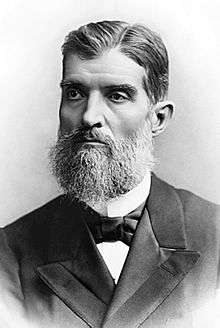

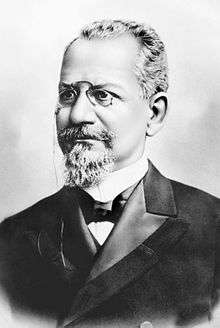


.jpg)

.jpg)
.jpg)
.jpg)
.jpg)
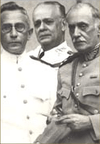
.jpg)

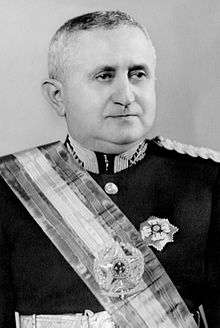





.jpg)


